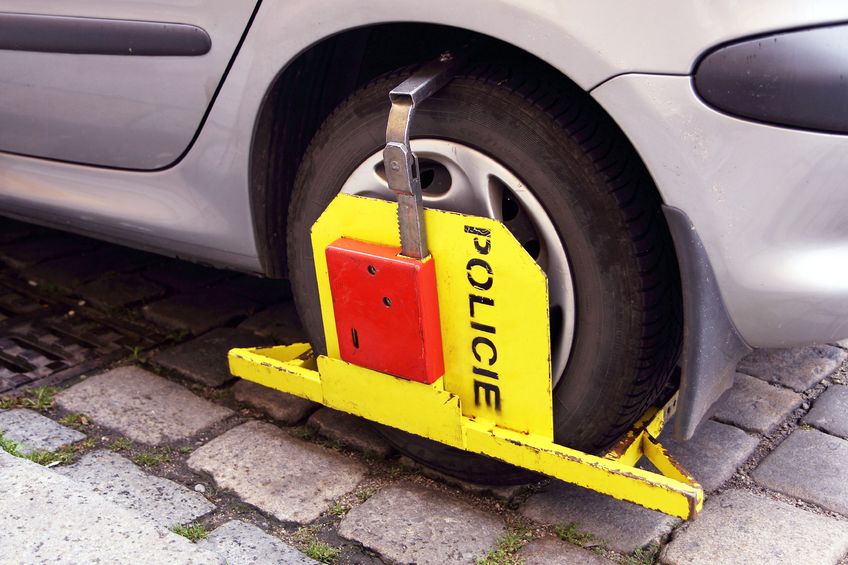Immobilization
Immobilizing a vehicle means temporarily stopping it from being used. In some cases a judge can also decide to have a seized vehicle immobilized as part of a sentence. This might be accomplished by using several devices including a club or car boot.
Immobilization is something that happens at the sentencing of the offender. For certain offenses the court must issue an order of immobilization. For other offenses, such an order is optional. The court will decide exactly where to have the vehicle immobilized.
Immobilization of a vehicle and impoundment of its plates is an option only if the offender owns the vehicle that was involved in the offense.
Mandatory Immobilization
There are some cases where the court must issue an order to immobilize the offender’s vehicle. The court will order a vehicle immobilized if the offender is convicted of a second OVI in the past 6 years. In such a case, the period of immobilization and impoundment of plates is 90 days.
The court is also required to immobilize the vehicle if the offender is convicted of operating a vehicle that he/she owns while under an OVI suspension. For a first offense the period of immobilization and impoundment of plates is 30 days. For a second offense in the past 6 years the period is 60 days.
Optional Immobilization
A court has the option to immobilize a vehicle that is owned by the offender if the offender:
- Was involved in the offense if the offender is convicted of driving under suspension
- Was in violation of a license restriction
- Was previously convicted of driving under some types of suspension within the past 3 years
For a second offense within 3 years, the period of immobilization and impoundment of plates is 30 days. If the court decides to order immobilization for a third offense within 3 years, the period is 60 days.
Immobilization is also optional if a vehicle owned by an offender was wrongfully entrusted to another person and the offender is convicted of that offense. If the court decides to immobilize the vehicle, the period of immobilization and impoundment of plates is 30 days for a first offense. For a second offense within 3 years, the period is 60 days.
Other Consequences of an Immobilization Order
 After an immobilization order is issued, the vehicle's plates are destroyed. When the immobilization period is over and the person has paid the OBMV a $100.00 immobilization fee, the person can get the vehicle released, apply for new plates, and apply for a new vehicle registration.
After an immobilization order is issued, the vehicle's plates are destroyed. When the immobilization period is over and the person has paid the OBMV a $100.00 immobilization fee, the person can get the vehicle released, apply for new plates, and apply for a new vehicle registration.
If a vehicle is found being operated on any street or highway in Ohio during the period of an immobilization order, it must be seized and criminally forfeited.
If a vehicle is not claimed within 7 days after the end of the period of immobilization, or if the offender has not paid the $100.00 fee to the OBMV, a written notice is sent to the offender’s last known address by the person or agency that immobilized the vehicle.
The notice tells the offender of the date the vehicle immobilization ended, that the offender has 20 days after the date of notice to pay the fee and obtain the release, and that otherwise the vehicle will be forfeited.
A person cannot sell a vehicle during the period of the immobilization order without the approval of the court that issued the order. The person has to apply to the court for permission to sell the vehicle or assign its title to someone else.
If the court believes that the sale will be in good faith and not just to “get around” immobilization it may send notice to the OBMV and offender that it approves of the sale. If the title to the immobilized vehicle is assigned or transferred without the court’s approval, the court may fine the offender the value of the vehicle.
If the title to a vehicle is assigned or transferred without court approval between the time of arrest of the offender who committed the offense and the time the court issues an immobilization order, the court must order the OBMV not to accept an application for the registration of a vehicle in the name of the offender for a period of 2 years.
If a court, after giving all interested parties notice and an opportunity to be heard, finds that the offender does not intend to seek release of the vehicle at the end of the immobilization period or that the offender will not be able to pay the towing and storage charges, it may order that title to the vehicle be transferred as provided under law.


